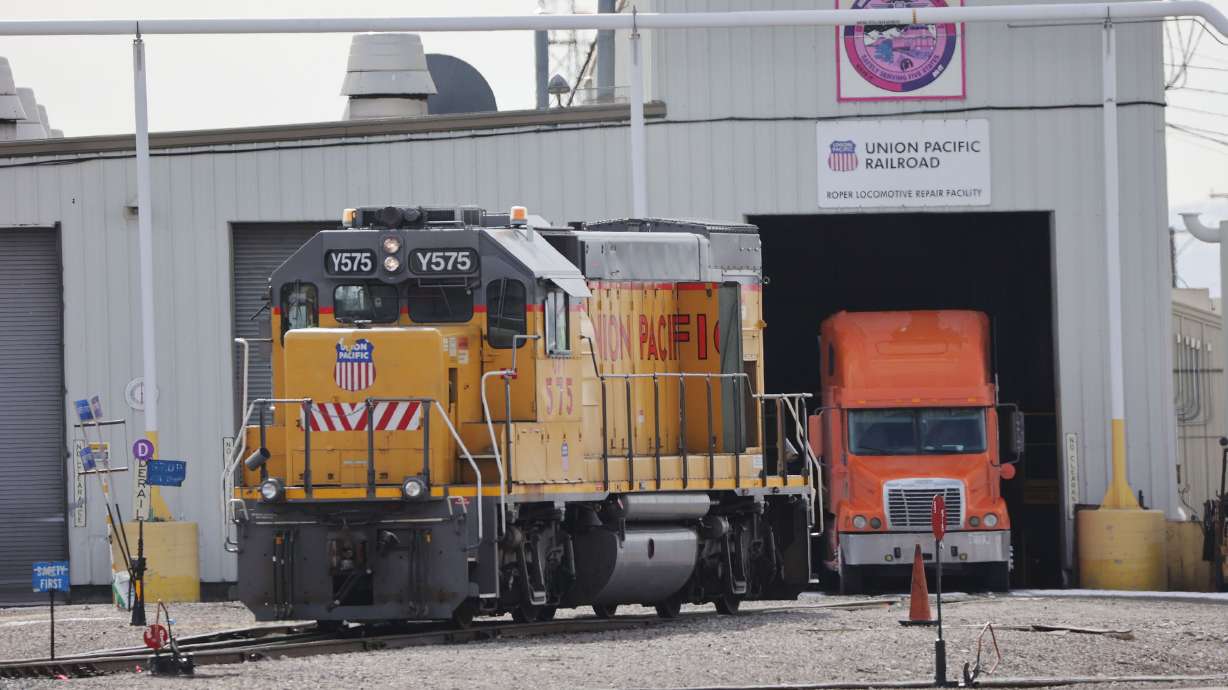Estimated read time: 4-5 minutes
This archived news story is available only for your personal, non-commercial use. Information in the story may be outdated or superseded by additional information. Reading or replaying the story in its archived form does not constitute a republication of the story.
SALT LAKE CITY — It appears the railroad giant Union Pacific and Utah lawmakers are playing nice again.
After a dust-up last week — when a House legislative leader accused Union Pacific of being an unwilling and uncooperative partner in air quality efforts and fast-tracked a bill to force the company to move to cleaner switchers by 2028 — the same legislator is pushing pause on the bill.
House Majority Leader Mike Schultz, R-Hooper, asked the Senate Transportation, Public Utilities, Energy, and Technology Committee to hold HB405 on Tuesday, citing now "productive" conversations with Union Pacific.
He read a letter in which Union Pacific pledged to remove three of its 40 "tier 0" switchers, or railroad locomotives used to maneuver rail cars inside a rail yard, from the Roper Rail Yard in Salt Lake City by the middle of the year. The company said it would replace them with four "tier 2" locomotives, which will help reduce pollution in the area, Schultz said.
Union Pacific has also "agreed to work" with lawmakers and "enter into a partnership" to bring "tier 4" or cleaner locomotive switcher technology for the Roper Rail Yard, Schultz said. Additionally, the company has "expressed willingness" to test some new electric technology in container movement technology "over the next year or two."
"We'll have to work out what those details are, but my understanding is there's a chunk of money from the federal government that could help offset that so the cost to the state shouldn't be too significant," Schultz told the Senate committee.
Schultz's request to hold the bill relieves the pressure on Union Pacific. HB405, which the Utah House approved without any dissenting votes, would have required rail yards that have four or more switchers to power those switchers "wholly by a hydrogen fuel cell or electric power" by no later than Jan. 1, 2028.
The bill specifically targeted Union Pacific's Roper Rail Yard, which has "produced enough emissions that is essentially equivalent to I-15 at rush hour" thanks to its over 40 switchers that use decades-old, "tier 0" technology, University of Utah atmospheric scientist Dr. Daniel Mendoza told lawmakers in a committee hearing last week.
Union Pacific is one of the largest "point sources" or highest concentrated sources of pollution in Salt Lake County, Mendoza said, noting that those switchers have to idle 24/7 in winter months to prevent the engine blocks from freezing or cracking.
Schultz took aim at Union Pacific, criticizing the company for seeing its biggest profit year in 2021 — raking in $6.5 billion — while trying new technology for freight switchers in other states like California and Nebraska but not Utah, even though parts of the state remain nonattainment areas under the EPA.
Schultz said for years Utah lawmakers including Rep. Steve Handy, R-Layton, have tried to work with Union Pacific for years, but conversations have amounted to nothing.
He also said the company tried to strong-arm him this year, telling him if he didn't drop one of his other bills (HB181, which he said seeks to prevent Union Pacific from "holding hostage" widening of roads around railroad crossings by refusing to pay for maintenance of those crossings), "that they would not move forward on these discussions in regards to freight switchers and some of the other concerns in the state."
"And so I am pretty disheartened, honestly, about their willingness to engage on this," Schultz said last week.
But Tuesday, Schultz indicated the tension between himself and Union Pacific has eased.
"I just want to thank Union Pacific for having these discussions and making the commitments they've made so far," he said. "We look forward to having those discussions and entering into some contracts over the interim to reduce the emissions that's coming from the Roper Rail yard."
Schultz then asked the Senate committee to hold the bill.
"If we need to continue talking about it during interim we sure can, but I like where it's going," he said. "I think Union Pacific's willingness to have an honest, open dialogue and work together to address the concerns, I think is best for the state."
Sen. Jake Anderegg, R-Lehi, thanked the company for its cooperation.
"My experience with Union Pacific is it's taken a while, but you guys have become much more engaged and active in working through problems," Anderegg said. "I also understand these switchers are super expensive pieces of equipment, and it's really hard to transition. So the willingness to do so, knowing that it's going to be an expense to you guys, is quite literally a good show of faith on your side."
The committee adjourned without taking action on the bill, effectively abandoning it for the 2022 Legislative session that ends on Friday at midnight.









